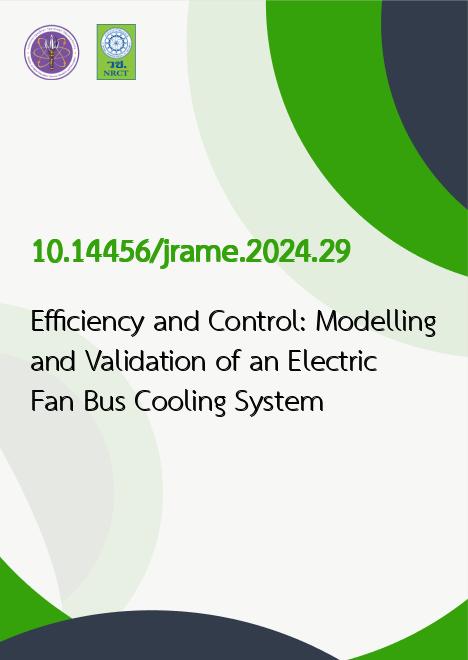
|
Efficiency and Control: Modelling and Validation of an Electric Fan Bus Cooling System |
|---|---|
| รหัสดีโอไอ | |
| Creator | 1. A. Kosin 2. A. Kosiyanurak 3. T. Sri-on 4. N. Pothi 5. J. Srisertpol |
| Title | Efficiency and Control: Modelling and Validation of an Electric Fan Bus Cooling System |
| Publisher | Thai Society of Mechanical Engineers (TSME) |
| Publication Year | 2567 |
| Journal Title | Journal of Research and Applications in Mechanical Engineering (JRAME) |
| Journal Vol. | 12 |
| Journal No. | 2 |
| Page no. | JRAME-24-12-029 (p.1-10) |
| Keyword | Electric fan cooling system, Heat exchanger, MATLAB/Simulink |
| URL Website | https://ph01.tci-thaijo.org/index.php/jrame/index |
| Website title | Journal of Research and Applications in Mechanical Engineering (JRAME) |
| ISSN | 2229-2152 |
| Abstract | The cooling systems in the majority of passenger buses typically depend on mechanical or hydraulic cooling systems. These systems utilize the engine's generated energy to function, leading to increased engine workload and higher fuel consumption. However, an electric cooling system presents the advantage of reducing the engine's workload and providing enhanced control. This paper focuses on modelling, validating, and presenting experimental results of an electric fan cooling system. Based on the accuracy assessment of the heat exchange system's mathematical model studied in this research, the evaluation was conducted using the Root Mean Square Error (RMSE) of the mathematical model's response compared to the actual system response obtained from experiments. It was observed that the RMSE of the outlet air temperature is 0.50, and the RMSE of the cooling water temperature at the water outlet is 0.21. Therefore, it can be concluded that the estimated mathematical model is accurate and closely approximates the real system. Additionally, it aims to utilize the benefits of the mathematical model to design a control system specifically tailored to the engine's operating conditions. |
